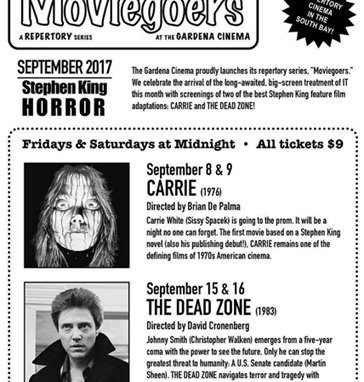AND SCOTT TOBIAS - "SECRETS TO MAKING GREAT STEPHEN KING MOVIES"
 With a new adaptation of Stephen King's It opening this Friday, there have been many articles of late discussing the many adaptations of King's works. A couple of days ago, Scott Tobias posted an article at the Washington Post with the headline, "The secrets to making great Stephen King movies"...
With a new adaptation of Stephen King's It opening this Friday, there have been many articles of late discussing the many adaptations of King's works. A couple of days ago, Scott Tobias posted an article at the Washington Post with the headline, "The secrets to making great Stephen King movies"...Some have stuck to the page, letter by letter, and others have only a casual relationship to the text — neither approach is a guaranteed winner.But there are some connections to be made among the strongest King adaptations. The first is counterintuitive: King characters are best understood from the inside out. That goes against conventional wisdom, because the most adaptable books tend to be short on interior monologue and long on external action, which is why a sledgehammer narrative such as James M. Cain’s “The Postman Always Rings Twice” has been adapted multiple times in English, in Italian (“Obsessione”), in German (“Jerichow”) and in Chinese (“Ju Dou”), and the novel’s murderous love triangle has been resonant every single time. Finding some visual analog for a character’s thoughts is a trickier proposition.
Yet the true horror of films such as “Carrie,” “The Shining,” “The Dead Zone” and “Christine” has to do with transformation, of ordinary stresses escalating into supernatural possession. In Brian De Palma’s hands, “Carrie” turns a teenage girl’s coming of age into a tale of profound isolation and sexual repression, with her desire for womanhood thwarted by her cackling peers on one side and the shame of her fanatically religious mother on the other. Even when her extrasensory powers torch the high school and beyond on prom night, it’s as heartbreaking as it is horrific, a manifestation of pain she can no longer manage.
In Stanley Kubrick’s “The Shining” and John Carpenter’s “Christine,” there’s a chicken-and-the-egg quality to the relationship between the lead character and the sinister object of their obsession. Perhaps the Overlook Hotel or that snarling 1958 Plymouth Fury would wreak havoc without them, but human weakness and temptation are animating forces in both films, to the point where a symbiosis develops between those forces. We might fear the goings-on in Room 237 or the animal roar of a sentient muscle car, but the source of each fear is so deeply connected to one man’s ravaged psyche, we can’t get a distance from it. David Cronenberg’s “The Dead Zone” makes a curse out of a gift, martyring a man who can see the future at the price of his life.
The other common thread is filmmakers who refuse to act as stenographers and invent or embellish beyond the page. Despite all the misbegotten adaptations of his works, King is most famous for detesting what Kubrick did with “The Shining,” a film many would rank among the scariest of all time. But at the center of that animus is King’s perception of creative disrespect: He wrote a deeply personal horror novel about alcoholism and authorship, only to have Kubrick strip it for parts with the ruthlessness of a chop-shop mechanic. Yet it was Kubrick’s prerogative as an artist to reimagine the novel and make the film a separate entity.
Although other filmmakers haven’t been as dismissive of the source material, they’ve benefited from their own invention. Frank Darabont had to expand on novellas to turn “The Shawshank Redemption” and “The Mist” into full-bodied features, but the former now trades places with “The Godfather” as the top user-rated movie on IMDb, and the latter concocts an ending of astonishing darkness. A little creativity was also necessary to turn King’s novella “The Body” into “Stand By Me,” but director Rob Reiner honors the nostalgia and ache at the heart of King’s coming-of-age story, even as it was impossible to write to the letter. When Reiner later took on King’s “Misery,” about an author held captive by his biggest fan, he favored psychological violence over the physical brutality of the novel, but he makes one thwack to the ankles count.
Carrie will be screened at midnight showings this Friday and Saturday at Gardena Cinema in California, as the first of "two of the best Stephen King feature film adaptations," according to the flyer partially seen above. The other film is Cronenberg's The Dead Zone, which will play Fri/Sat midnight the following weekend.
Updated: Monday, September 4, 2017 12:11 AM CDT
Post Comment | View Comments (1) | Permalink | Share This Post



